




 |
   |
 |
|
Viima Vijaya Vikings in Tibet Kurt Vile Jacques Villeneuve |
Vera Vinter Violent Femmes Kim Virant Kåre Virud |
Visible Wind Vision Visions Vly |
The Volt Per Octaves Vos Voisins Vow Wow Voyager |
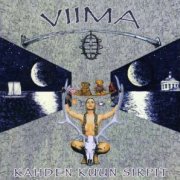 |
Kahden Kuun Sirpit (2009, 45.11) ****/TTTTAutio PeltoUnohtunut Sukellus Kahden Kuun Sirpit |
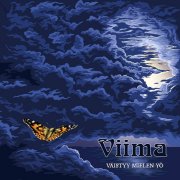 |
Väistyy Mielen Yö (2024, 44.32) ****/TTTTyttö TrapetsillaÄiti Maan Lapset Pitkät Jäähyväiset Perhonen Vuoren Rauha |
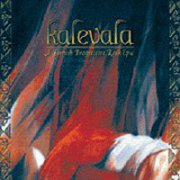 |
Kalevala: A Finnish Progressive Rock Epic (2003)[Viima contribute]Kaukomielen Kaipaus [on reissue only] |
 |
Tuonen Tytär II: A Tribute to Finnish Progressive rock of the 70's (2009)[Viima contribute]Uuteen Aikaan |
Current availability:
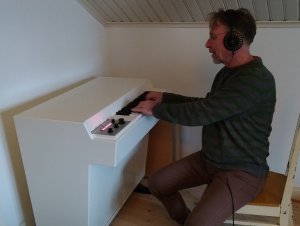 |
|
| Risto Pahlama at the MkVI | |
Mellotrons used:
The fact that Finns Viima owe a debt to Focus on their second album, 2009's Kahden Kuun Sirpit, is obvious from the off, but that's so much more welcome than the usual half-arsed range of influences that forgiveness is easy. Very easy indeed. If I have a criticism, it's that they choose to use vocals, if only occasionally; the lengthy instrumental sections are so good that it seems a shame to spoil them with rather below-par vocalising. All four tracks on the album differ, from the Focusisms of opener Autio Pelto through the jaunty, folkish Sukellus to the jazz/folk feel of the slightly overambitious 'side-long' title track, making Viima a very rare beast in the modern progressive scene. Kimmo Lähteenmäki plays keys, including real Mellotron this time round, with strings and/or choir on every track, plus possible flutes doubling strings on Sukellus. Given that I knew next to nothing about Viima before hearing Kahden Kuun Sirpit, this is an extremely pleasant surprise; not jaw-dropping, but an interesting, genuinely progressive album, within the genre's usual limitations, although their debut is rather less interesting.
Despite having three members in common with their earlier incarnation, the Viima of 2024 bears little comparison with the one of fifteen years earlier. Väistyy Mielen Yö is a smörgåsbord of a record, encapsulated on (almost) side-long Äiti Maan Lapset, which shifts through several different feels, including Canterburyesque parts and an odd, lopsided groove around the thirteen-minute mark. Scandinavian folk is still an ever-present influence, but the guitars rock harder and the overall effect is of a band who've learned to (kind of) groove, albeit in a prog/folk kind of way. Mellotron across the board, with (presumably, as it's uncredited) Kimmo Lähteenmäki's flute section on folky opener Tyttö Trapetsilla, several string parts from Risto Pahlama on Äiti Maan Lapset, a series of string chords from guitarist Mikko Uusi-Oukari under the synth solo on Pitkät Jäähyväiset, Hannu Hiltula's strings on Perhonen and flutes (alongside Hiltula's real one) and strings from Uusi-Oukari again on closer Vuoren Rauha. Like all the best progressive releases, I'm sure this will improve with age and familiarity; just don't make us wait around for another fifteen years for a follow-up! Incidentally, Mikko wrote to tell me the band use his MkVI Mellotron.
See: Samples etc. | Colossus
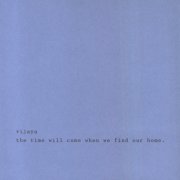 |
The Time Will Come When We Find Our Home (2005, 17.30) ****/TTLife - a Slight ChangeEnd of Love Street Put on More Make-Up A Few Good People |
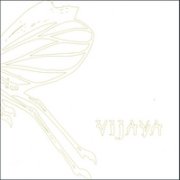 |
Vijaya (2006, 35.00) ****/TTTTÖrby SlottLife - a Slight Change Great Big City Commuter Train (Time Theft) End of Love Street Your Gun Will Never Set You Free A Few Good People Reflections Pale From the Bright Lights |
Current availability:
Mellotrons used:
Vijaya is a Swedish singer-songwriter, active since the mid-'90s, although she is only now (mid-2005) in the process of recording her debut album. The Time Will Come When We Find Our Home is her second EP and (I believe) the first to feature Mattias Olsson (Änglagård, Pineforest Crunch etc.)'s production work, including (of course) his inimitable Mellotron, Optigan and so forth. Vijaya specialises in laid-back, melancholy little songs (now there's a surprise, given Mattias' involvement), sung in English, which would almost certainly appeal to a sector of the British (and maybe American?) indie crowd, if only they were actually exposed to it. My personal favourite is Mellotronless opener Life - A Slight Change, but there's little to criticise in any of the tracks here present. Mellotron? A full-on string part closes End Of Love Street, while a flute melody runs through the verses of Put On More Make-Up, with strings towards the end and Mattias' Chamberlin Rhythmate on A Few Good People, although you're unlikely to spot the latter unless you actually know it's there.
And the following year... Vijaya carries on her good work from the EP, with more melancholy, muted low-fi singer-songwriter stuff. It seems the Time Will Come... EP was a taster for the album; two of the three tracks they have in common seem to be the same versions. The rest of the material follows similar lines and it's fair to say that if you like previous Mattias Olsson productions, you'll like this. Conversely... Loads of Mellotron, with particular highlights being the very full-on strings (various sounds) on Örby Slott, End Of Love Street and Pale From The Bright Lights, with some of the Mellotron parts being so high in the mix that they drown out everything else. Yes! Apart from the Rhythmate in A Few Good People, you can spot the Mellotron in every highlighted track, although chances are you'll miss sounds such as the Chamberlin piano/lap steel/harp, MkI Mellotron moving cellos/violins and woodwinds, clarinet, boys choir and Hammond with pedals, but they're all in there somewhere. Plenty of Orchestron and Optigan, too, not to mention several strange organs, including the Silvertone (played by Vijaya), the Elgam and the Malmsjö 500. Anything new? Thankfully, no.
As previously stated, if you like Roth-Händle productions, you will assuredly like Vijaya. Despite the writing credits, most of Mattias' productions are effectively his albums with different people writing and singing and these are no different. Recommended.
 |
Alchemy Ave. (2017, 34.01) **½/T½Silver YearsSilhouette Dial 2768437 to Wake Up Trip the Light Don't Cry Robot Löwenweise Midday Moon Listen/Repeat Ghost |
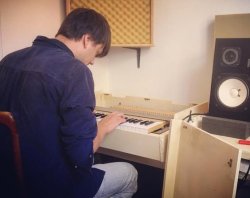 |
|
| Thijs Keulen at Matthijs Herder's M400 | |
Current availability:
Mellotron used:
Groningen's Vikings in Tibet's website calls them 'cinematic indie', which strikes me as a pretty accurate description of their 2017 debut, Alchemy Ave. I wish I could like this music more than I do, but their upbeat, light-as-air indie lacks substance, at least to my ears. Perhaps it works better live. Any better tracks? Maybe opener Silver Years, while Listen/Repeat finally fulfils that 'cinematic indie' description.
Thijs Keulen plays producer Matthijs Herder's M400, with heavily-reverbed strings on Silver Years, a string line on Silhouette and strings and choirs on Midday Moon, all to reasonable effect. Although Herder produced their follow-up, 2020's The Art of Staying Half Awake, it was recorded at the band's own studio, rather than his and, as a result, is resolutely Mellotron-free.
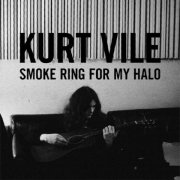 |
Smoke Ring for My Halo (2011, 46.49) ***/T |
|
| Baby's Arms Jesus Fever Puppet to the Man On Tour Society is My Friend Runner Ups In My Time Peeping Tomboy |
Smoke Ring for My Halo Ghost Town Untitled |
|
Current availability:
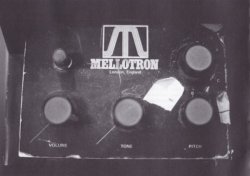 |
Mellotron used:
Kurt Vile (actually his real name, it seems), ex-The War on Drugs, is an American singer-songwriter with a Dylanish edge, whose fourth album, 2011's Smoke Ring for My Halo, combines his core style with something of an alt.rock edge, not to mention occasional mock-Spectoresque touches. To be honest, a few tracks go on a bit - the album might have been better had it not topped forty minutes - but the overall effect is decent enough, within its limitations.
I'd thrown this into the sample dungeon before discovering the booklet pic (right) of the control panel of a battered-looking Sound Sales M400; to be honest, although it takes both Vile and The War on Drugs' Adam Granduciel to play the Mellotron flute and string parts scattered throughout Society Is My Friend, they're easily mistaken for samples. Well, that's my excuse and I'm sticking to it.
 |
Private Paradise (2007, 54.40) *½/T |
|
| Foolin' Around You Are Father Tout Dire Ones Accepterais-Tu? Why Did You Come? Vaguement |
Lullaby Private Paradise Etrangers Women Come Women Go Mother Earth |
|
Current availability:
Mellotron used:
Jacques Villeneuve's story has to be one of the oddest on this site: a respected Formula One racing driver, he took the unusual step for someone from his profession of diversifying into music with 2007's Private Paradise. It shouldn't come as any great surprise to learn that it's pretty terrible; Villeneuve's not always fully in-tune vocals spout his frequently risible lyrics on a succession of tedious, overlong, self-written ballads, possibly best-heard on Father: "Father, I miss you so/Father, why'd you have to go?" Pure genius. A handful of tracks are no worse than 'dull', but with so many painful clunkers, the album was doomed to failure.
Fred Jaffre plays Mellotron, with a full-on flute part opening Lullaby, although that would appear to be your lot. I think it would be fair to say that the album was not a success; by the end of its year of release, it had apparently sold under a thousand copies across the entire North American continent. Ouch. OK, it's bland and dull, but so is most music; surely his name should've sold more copies than that? Presumably not.
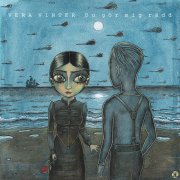 |
7" (2011) ***½/½ Du Gör Mig Rädd Drömde om Dig |
Current availability:
Mellotron used:
Anna "Vera Vinter" Larsson's first release, 2011's Du Gör Mig Rädd 7", is a breezy slice of Scandipop, produced by Mattias "Änglagård" Olsson, as if to prove that pop can actually be good. Then again, this has little to do with mainstream pop, which is why it's as good as it is.
David Lundberg plays one of the Roth Händle Mellotrons, but, aside from a minuscule burst of near-subliminal strings, it's hard to know where. Knowing Mattias, it's one of his most obscure sounds, subsequently hidden in the mix; the wineglasses, perhaps. Or the tuned bees. Anyway, cool song, no obvious Mellotron.
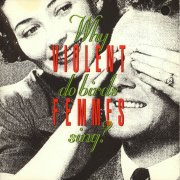 |
Why Do Birds Sing? (1991, 42.23) **½/½ |
|
| American Music Out the Window Look Like That Do You Really Want to Hurt Me Hey Nonny Nonny Used to Be Girl Trouble He Likes Me |
Life is a Scream Flamingo Baby Lack of Knowledge More Money Tonight I'm Free |
|
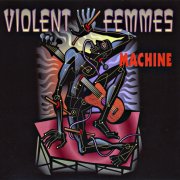 |
Machine (1994, 21.38) **½/½MachineMachine (Dogpile remix) Balkan Falcon Chinese Rocks Color Me Once (live) |
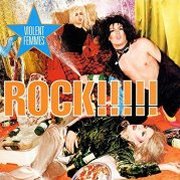 |
Rock!!!!! (1995, 32.12) **½/T |
|
| Living a Lie Tonight Bad Dream I Danced Thanksgiving (No Way Out) Dahmer is Dead Life is an Adventure She Went to Germany |
I Wanna See You Again Didgeriblues Death Drugs Sweet Worlds of Angels |
|
Current availability:
Mellotrons used:
I'm told the Violent Femmes were at their peak in the '80s, 1991's Why Do Birds Sing? being their first real letdown. I can believe it, I have to say; dullard 'alternative' stuff with a slight Americana bent doth not make for an especially fun listen, round these parts, at least. Keyboards throughout from producer Michael Beinhorn, including Mellotron on two tracks. Yes, Do You Really Want To Hurt Me is a cover of the execrable Culture Club song (is there any other kind?), made surprisingly palatable by the Femmes' approach, albeit with no more than a hint of strings halfway through. Used To Be has a more overt strings part, though nothing you haven't heard a thousand times before, in all honesty, mixed with real strings into the bargain. Nowt special.
Machine (from '94's New Times) doesn't inspire me to track down the album, sadly. The rest of the five-track EP's exactly as such things should be: one remix, one exclusive track, one messabout (a rubbish version of the Heartbreakers'/Ramones' splendid Chinese Rocks) and one live track. Bassist Brian Ritchie, one of the band's two core members, plays Mellotron, with a brief, rather skronky string part on that exclusive, Balkan Falcon.
Rock!!!!!'s sleeve is a heavy-handed, not to say several years too late satire on late-'80s L.A. hair metal, but the group were well past their sell-by date by this point, so I suppose we shouldn't be that surprised. OK, there's an awful lot worse about, but it all seems rather uninspired, certainly in comparison to their cutting-edge '80s albums; the fact that it was initially released only in Australia says it all, really. The only track that stands out in any way is Didgeriblues (so what's all this Aussie business, then?), which seems to've been mastered louder than the rest of the album and has a ripping didgeridoo part from Ritchie. Mellotron on one track, from the inimitable Sigmund Snopek III; closer Sweet Worlds Of Angels has a really very nice flute part, from someone who knows his Mellotrons. Sadly, it's the best thing on the album, so if you liked their early stuff, I think I have to recommend that you stick to that and avoid their reformation material.
See: Sigmund Snopek III
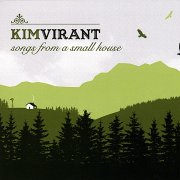 |
Songs From a Small House (2007, 42.20) **/T |
|
| Love Ain't for the Weak Jesse's Song Genius Morning Letting Go Crystal Clear Cozy Little Babies 3am Careless Girls |
Constant Motion Western Sky |
|
Current availability:
Mellotron used:
Seattlite (is that a word?) and ex-Lazy Susan Kim Virant sits at the indie end of Americana, going by Songs From a Small House. I'm afraid the end result is exceedingly dullsville; the nearest I can get to 'interesting' is the moment she finally unearths a previously-undiscovered reserve of energy on Constant Motion, albeit briefly.
Gary Westlake plays Mellotron strings on one of the less dull tracks, Careless Girls, sounding relatively real, although that's no guarantee, of course. I don't think you're going to go too far out of your way for this one, anyway.
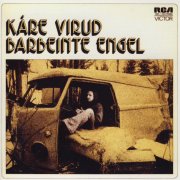 |
Barbeinte Engel (1974, 35.10) ***/TT |
|
| Showet er Over Ola Tung's Kafe Mjuke Linjer Ola e God Hei Marianne Oslo Blues Vi Digga Rokkenroll Ville Bare Se Byen Din |
Mamma, Jeg Har Tenkt På Deg Sommerferie Blues Gravskrift 1919 Riksvei 73 Barbeinte Engel |
|
Current availability:
Mellotron used:
Discogs describes Kåre Virud as a 'Norwegian blues musician' and after hearing his debut, 1974's Barbeinte Engel, who am I to argue? It's allegedly 'Norway's first blues record', Virud tackling several micro-genres, not least acoustic bottleneck blues (Oslo Blues), electric blues (Ola Tung's Kafe) and rock'n'roll (Ola E God is a slight rewrite of Johnny B. Goode, the Stones cop (Jumpin' Jack Flash) on Vi Digga Rokkenroll), while Sommerferie Blues is (of course) a Norwegian-language Summertime Blues, sounding more like Eddie Cochran's original than The Who's coruscating live version. Best tracks? Gentle opener Showet Er Over and the closing title track.
Popol Vuh's Pete Knutsen plays Mellotron, with background strings on Showet Er Over, a flute line and distant strings on Mjuke Linjer and upfront strings on Ville Bare Se Byen Din. Not the most obvious Mellotronic setting, then, but good to hear it used on such an unlikely album.
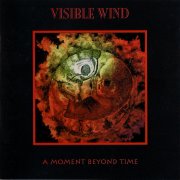 |
A Moment Beyond Time (1991/1999, 43.49/51.26) **½/0 (T½) |
|
| Behind the Curtain A Moment in Time Soleil d'Aube Chasing the Skyline Ulysse's Return Seeking the Moon Solitude The Faded Years |
Running Backwards A Moment Beyond Time ? Beyond the Curtain |
|
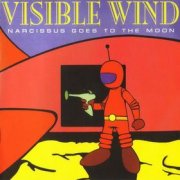 |
Narcissus Goes to the Moon (1996, 68.27) ***/TTT |
|
| A Succulent Anachronic Pastiche Fuzzy Concept By the River Xenophobia Introvenus Intravenus Lunar Doubts Join My Soul Race on a Pseudo Flying Carpet Nothing Left to Hide |
Ambulance The Awakening Camel Ride Dream A Bubble Burst Prisonnier du Temps The Preacher in the Desert Quicksand The Mad Tryst A New Reality So Divine |
|
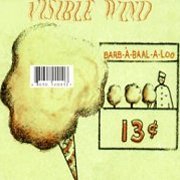 |
Barb-à-Baal-a-Loo (2001, 54.19) ****/TTT |
|
| Vladivostok The Healer/Maniaquerie Barb-à-Baal-a-Loo Hollow Emptiness Mal Brook Lost Ideals Dans le Vide Qui Sème le Vent... |
Neandertal Visages de Sable Recommencement Freed Again I Was There |
|
Current availability:
Mellotrons used:
Visible Wind are another English-as-second-language band who haven't understood the comic potential of the word 'wind' in the wrong context; Belgian band Now have to be the worst offenders with their debut, Complaint of the Wind (stop laughing at the back), but these guys aren't that far behind, sadly. It seems they've been going since the early '80s, although they've managed to shuck off some of their more overt neo-progisms over the years. I haven't heard '88's Catharsis, thankfully, but much of '91's A Moment in Time is pretty awful neo-prog, top offenders including The Faded Years and the title track, although parts of Chasing The Skyline are pretty inventive, while Solitude is a beautiful classical guitar piece. Now, a minor conundrum: how is it that a Mellotron-free album, recorded several years before the band's purchase, can suddenly become a Mellotron album? Because, dear readers, for reasons best-known to themselves, the band reissued their by-then out of print title eight years later, adding not only a couple of bonus tracks (italicised above), but overdubbing Mellotron onto both bonuses and the title track. Stephen Geysens adds string swells to Running Backwards and chordal strings to new closer Beyond The Curtain, with strings and choirs added to various parts of the lengthy title track, to passable effect.
While I haven't heard '94's Emergence, '96's Narcissus Goes to the Moon is a considerable improvement over the band's early work, although the song structures are still rather simplistic by symphonic standards. Improvement it may be, but even on the longer material, I find myself wishing the band would be more adventurous and that the guitarist would stop pretending he was playing in a part-time metal band (a common problem in current prog). Originality is an issue, too; there's a direct Saga rip on Intravenus and what sounds like a Jadis vocal line on Lunar Doubts, though I'm probably being a bit harsh; much of the material holds the interest, despite its over-reliance on Geysens' vocals, which, to his credit, are almost accentless. At some point in the mid-'90s, Geysens bought a Mellotron and uses it a reasonable amount here; choir chords on Fuzzy Concept, a polyphonic flute part on Xenophobia, followed by some full-on, top-of-the-mix strings. More choirs on the lengthy Intravenus (as against the short instrumental Introvenus) and another upfront string part on Race On A Pseudo Flying Carpet. A couple of the highlighted tracks above only feature a few seconds, mind you, with the strings at the beginning of Nothing Left To Hide being no more than a hang-over from the end of the previous track, but overall, Geysens uses his Mellotron imaginatively and doesn't overdo it, unlike some I could name.
Well, give a band a few years... Five years on, the strangely-titled Barb-à-Baal-a-Loo (no, no idea) sounds almost nothing like its predecessor, never mind the band's highly derivative early work. Heavier than before, it's also far more inventive, sounding like... well, no-one, really and it's not often you can say that in the progressive world these days. There are still some standard song structures dotted around (notably on Lost Ideals), but the band take interesting and unexpected twists and turns all over the place, which is more than you can say for 99% of their neo-prog contemporaries. Geysens' keyboard work is even better than on Narcissus..., too, with plenty of ripping (in a 'has to be real' vein) Hammond and lots of Mellotron, mostly strings, with some highly effective swells in Dans Le Vide, slightly recalling Crimson's Epitaph. Even where he uses polysynth patches (analogue? Digital?), as on Recommencement, he manages to keep them interesting and original, rather than the awful 'this one's straight outta 1988!' approach that still seems all too common amongst his contemporaries.
According to their (now defunct) website, there are a huge number of unofficial recordings available from the band; well over a hundred, dating back to 1983, if they can be believed, so it seems highly likely that many of the later ones also feature their M400. So; do you buy these albums? A Moment in Time: not unless you're a neo-prog fan. Narcissus Goes to the Moon: do you have a tolerance for fairly inventive neo-prog? Do you object to a lack of key-changes in your progressive listening? If these aren't problems, there's some nice (real) Mellotron work on the album. Barb-à-Baal-a-Loo: What a surprisingly excellent record - if only more current prog bands would make this much effort to do something new, while not forgetting the all-important exhortation to 'write some songs!' Recommended. Incidentally, their 2002 BajaProg set, La Dæmentia Romantica - Live in Mexicali, released in 2006, features Mellotron samples.
See: Samples etc.
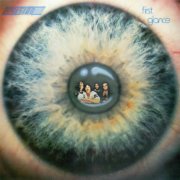 |
First Glance (1981, 40.03) ***/T |
|
| Down the Line Hear Me Talking Elyse Anyone's Guess I Should Know You Anna No Choice Following You |
Evolve Revolve You Don't Wanna Talk Bring Down Hit or Myth Gamble |
|
Current availability:
Chamberlin used:
Booth, Davis, & Lowe (location: 'Southwest', one album, 1978's Prototype) soon morphed into the equally-obscure Vision, whose lone release, 1981's First Glance (loving the optimism, guys!), is a fairly typical hard-ish rock/AOR hybrid of the era: pomp, essentially. As you'd expect, while very competent, Vision lacked that crucial X factor, the album's thirteen tracks (nothing even reaches four minutes) compromised by a bargain-basement production. At its best on the vaguely proggy Anna, You Don't Wanna Talk and closer Gamble, with killer pomp keyboard work on I Should Know You and Following You, the 'yeah, whatever' likes of Anyone's Guess (poundshop Toto), Following You (standard-model AOR) and Hit Or Myth lose it a crucial half star.
Oddly, for such keyboard-heavy music, the quartet used guest players, including one Brad Buxer on 'piano, synthesizer, Chamberlin' on four tracks, Chamby on two, with rather unimaginative chordal strings on Elyse and a more arranged part on Bring Down. Unlike full-blown prog obscurities, this isn't the kind of album reissue labels are likely to take a punt on, but copies go for affordable money on Discogs.
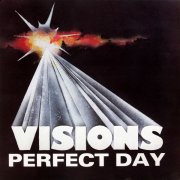 |
Perfect Day (1978, 33.29) **½/T½Perfect DayLight Your Way The Lord's Song He'll Walk on the Water Jesus is the Rock The Everyday Life Real Peace Matthew 8-23-26 And He Loves Me |
Current availability:
Mellotron used:
Georgia's Visions were a late '70s Jesus Rock outfit who (according to Discogs) released two albums, '78's Perfect Day being the first. It starts out as a light, soulful pop record with the expected goddy lyrical content, at its most preposterous on melodramatic closer And He Loves Me, clearly intended to draw unbelievers in through the medium of dance. It swiftly moves into other musical areas, though, notably the boogie-woogie of He'll Walk On The Water, complete with ripping slide work, Jesus Is The Rock's Allman Bros. twin-guitar vibe, the jazzy The Everyday Life and the funky, Clavinet-fuelled Matthew 8-23-26.
Tracy Reynolds plays Mellotron, with strident strings on The Lord's Song and And He Loves Me, in full 'orchestral-replacement' mode, which isn't actually a recommendation. Why such a (relatively) high rating, then? Despite its multiple failings, this didn't have me gnawing the carpet, while a couple of tracks actually got my foot tapping, if only gently. Don't take that as a recommendation, either.
![Vly, 'I/[Time]'](images/vly-i.jpg) |
I/[Time] (2015, 60.34) ***/T½ |
|
| Circles Time Time Elapsed Headache Out of the Maze Hypnotic Time Remembered Silver Beaches |
Message in Water Dark Days Perfect Place Time Forgotten |
|
Current availability:
Mellotron used:
Vly are a truly international ensemble, formed when guitarist Karl Demata (UK, ex-Crippled Black Phoenix) was put in touch with US vocalist Keith Gladysz and they began collaborating online without having actually met. The modern world, eh? Three more musicians entered the fray, another Brit, Demata's CBP colleague, bassist Chris Heilmann, Italian keyboard goddess Elisa Montaldo and legendary drummer/studio owner/everything elser Mattias Olsson (Änglagård, Necromonkey, a million others). The end result of their globe-spanning efforts was 2015's I/[Time], a slightly uneasy combination of Floydian slowcore prog, post-rock and indie, amongst other influences, the progressive elements largely beaten into submission by the indie ones, not least Gladysz's wispy vocals. On the sonic front, someone sticks slabs of (real?) Floyd-esque Hammond all over, there's a brief burst of programmed rhythm on Dark Days, Demata's guitar work on Perfect Place clones Gilmour, while Olsson's drum work (about the best thing here) is as incendiary as ever. More than anything, though, this reminds me of the modern, Hogarth-fronted Marillion, with its Radiohead/Talk Talk moves. Any highlights? Maybe relatively dynamic opener Circles, Out Of The Maze and Dark Days, while the brief 'Time' vignettes scattered across the record make a pleasant change from the album's drearier aspects.
Without specific instrumental credits, it seems likely that the album's Mellotron work is all down to Mattias, not least due to his ownership of multiple machines, and a 'produced at Roth Händle Studios' credit. He doesn't overuse it, with background strings on Circles, strings and flutes on Time and Hypnotic and strings and choirs on Message In Water (listed as Message In The Water on their Bandcamp page, despite the definite article-free lyric) and Dark Days. This has picked up a slew of hugely positive reviews, so I'm sorry not to be able to add to them, but I can't honestly recommend this for either the music or the Mellotron.
See: Crippled Black Phoenix | Änglagård | Elisa Montaldo
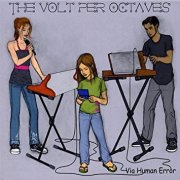 |
Via Human Error (2009, 26.10) ***/½La Digestion de SueñosEvatronic Berniesphere Thingamafunk Transistors Dance Human Error |
Current availability:
Mellotron used:
The Volt Per Octaves? Analogue synthesists will need no explanation, for the rest of you, it's a voltage-to-pitch standard used by Moog, ARP, Roland and others. The band are a current synthpop outfit, consisting of Nick and Anna Montoya and their daughter Eva, all of whom play Moogs ancient and modern, amongst other keys, collaborators including the late Bernie Worrell and both members of The Moog Cookbook, Brian Kehew and Roger Manning. 2009's Via Human Error EP is their third release, its influences more '80s/'90s electronica than anything earlier; pleasant enough, but leaving this reviewer slightly cold.
Kehew plays Mellotron, with distant cellos on opener La Digestion De Sueños, although that would appear to be it. The Montoyas clearly understand their instruments, while their 'no laptops' policy has to be applauded; all power to them (presumably 110v), even if it's not really my bag.
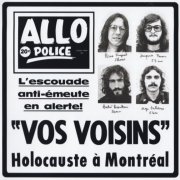 |
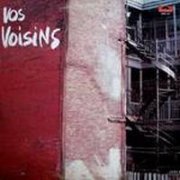 |
Holocauste à Montréal [a.k.a. Vos Voisins] (1971, 33.36) ****/TTVoisins (Mon Chum)Sous la Lune L'Instrumental Tania Le Monstre de la Main Ya Just de T'Ca Le 3/4 de l'Archevèque |
Current availability:
Mellotron used:
Vos Voisins (Your Neighbours) were one of Québec's (and probably Canada's) first progressive bands, taking their cues from the first Gentle Giant album and Ekseption's mad, Hammond-fuelled takes on the classical canon, amongst others, with maybe a hint of Deep Purple's organ filth. To my knowledge, 1971's Holocauste à Montréal was their sole album, quickly re-released as Vos Voisins after some long-forgotten fuss over the sleeve design. Despite the above influences, the band had already found their own voice by the time they recorded the record, knocking spots off, say, the early Ange albums (to pick the biggest French-language prog band of the, or probably any time), combining classical, rock and jazz in a slightly different way to pretty much anyone else I can think of, which is probably enough to count as 'original', especially when you consider when this was made.
Keys man Jacques Perron played their friend Yvon Deschamps' M300, with strings on Tania and strings and flutes on Le Monstre De La Main, although nothing on probably the album's best track, closer Le 3/4 De L'Archevèque. Although of slightly variable quality, this really is an outstanding album in places, well worth tracking down.
See: Yvon Deschamps
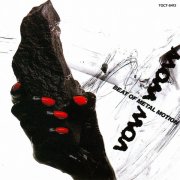 |
Beat of Metal Motion (1984, 43.39) ***½/T |
|
| Break Down Too Late to Turn Back Mask of Flesh (Masquerade) Diamond Night Feel Alright Baby it's Alright Lonely Fairy Sleeping in a Dream House |
Rock Me Beat of Metal Motion |
|
 |
Cyclone (1985, 43.28) ****/T½ |
|
| Premonition Hurricane Hell-Raisers Wanted Love Walks U.S.A. Need Your Love Eclipse Siren Song |
Shake Your Body Rock Your Cradle You Know What I Mean |
|
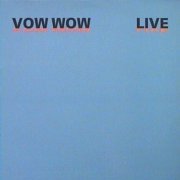 |
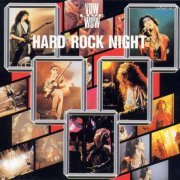 |
Live [a.k.a. Hard Rock Night] (1986/87, 48.57/73.29) ****½/TTT½ |
|
| Introduction - Beat of Metal Motion Go Insane Doncha Wanna Come (Hangar 15) Guitar Solo (Snow Flakes) - Pains of Love Too Late to Turn Back Mask of Flesh (Masquerade) Vocal Solo (Cry Me a River) I'll Wait a Lifetime |
Keyboard Solo (including Arabesque) Signs of the Times Love Walks Premonition Hurricane Shot in the Dark Guitar Solo (CCG) - You Got it Made Nightless City |
||
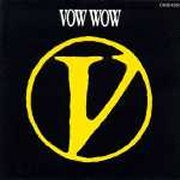 |
V (1987, 47.19) ***/T |
|
| Don't Tell Me Lies Somewhere in the Night The Girl in Red Break Out Cry No More Same Town Born to Die Waited for a Lifetime |
Don't Leave Me Now War Man |
|
Current availability:
Mellotrons used:
Vow Wow rose from the ashes of Bow Wow, one of Japan's best-loved homegrown rock outfits, in the early '80s. Instead of the original band's two guitar lineup, Vow Wow went for one guitar (band leader and wunderkind Kyoji Yamamoto) and keys (the superb Rei Atsumi) and a far more sophisticated sound than their previous incarnation. Sadly, several of their albums have never been available outside Japan, including their debut, 1984's Beat of Metal Motion, some of its best material later becoming more widely available in live versions, the best of the 'can't hear it anywhere elses' being mini-epic Sleeping In A Dream House. Atsumi's Mellotron turns up here and there, with background strings on opener Break Down, background choirs on Diamond Night and, finally, slightly more upfront strings on Sleeping In A Dream House. Interestingly, I've only just noticed (I've owned this for a long time) that Rock Me was reworked as Rock Me Now for 1989's sub-par Helter Skelter.
The following year's Cyclone was the band's first European release, its best otherwise-unavailable material including Need Your Love and a track given away on a flexidisc (remember them?) with initial pressings, Wanna Get Home, found on some CD versions. Again, three Mellotron tracks, with lush strings and choirs on instrumental opener Premonition, background choirs on U.S.A. and upfront strings on Need Your Love (although the cello's probably something else). For reasons unknown, '86's III was not only not released overseas, but, inexplicably, is also Mellotron-free, even on live Mellotron-fest Pains Of Love.
1986's Live was swiftly reissued the following year as the considerably longer, CD-only Hard Rock Night, just as Live was released in the UK on vinyl. It contains the best of their repertoire up to that point, recorded in front of a partisan home crowd, from killer opener Beat Of Metal Motion through Pains Of Love to their classic, Hurricane. Atsumi's keyboard rig consisted of the best from all eras; MiniMoog, Jupiter-8, DX7 and, of course, a Mellotron M400. There are some nice string swells on Doncha Wanna Come and epic chords in the short introduction to Hurricane, Premonition, but he gives the full five-star treatment to big ballad Pains Of Love. A picked guitar intro, Snow Flakes, with Genki Hitomi's plaintive (if strongly-accented) vocal leads into a massively effective key change and a blast of Mellotron strings, which Atsumi keeps up for the rest of the song, plus a short flute solo and a burst of choirs at the end. Absolutely magnificent. The longer version of the album adds mucho Mellotron choir and strings on Atsumi's keyboard solo, much as I remember it live from the time, while it becomes apparent that Love Walks has a brief string part and Hurricane features some background choir stabs.
Although the band used their Mellotron to great effect live (I still have fond memories of several London Marquee gigs at the time), it barely pokes its head above the parapet on their next studio effort, V (as in 'Five'). In fact, it's extremely difficult to work out what might be Mellotron and what might be generic string sample, or choir for that matter. It sounds like choir on a couple of tracks, but I'm willing to be proven wrong. The album's best track, Waited For A Lifetime, actually features what sounds like decent DX7 brass, despite my general dislike of the instrument. The band headed further towards the mainstream after this and the Mellotron was quietly retired from both the road and the studio. Apparently Rei still has his machine, spotted on various relatively recent releases, so at least he hasn't dumped it, like so many other past players.
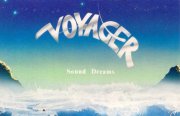 |
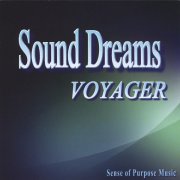 |
Sound Dreams (1987, 44.13) ***/T½Dream WorldA Forest of Dreams [a.k.a. Morning Light] Twilight Dream (Dream of the Heart) Dream of the Golden Flower [a.k.a. Whispers in a Dream] Dream in a Water-Garden [a.k.a. A Shaman's Dream] A Dream of Peace |
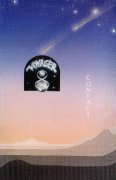 |
Contact (1987, 38.45) ***/TTArrivalDancing in the Light Caravan of Time Cosmic Dance (part I, II & III) Voices of Creation |
Current availability:
Mellotrons used:
Voyager were Tom Moore's electronic/new age project, aided and abetted on some of his releases by Charles Thaxton, the pair playing keyboards and synths, digital and analogue. 1987's Sound Dreams was originally released only on cassette, its 2010 CD issue (my source for this review) changing several titles and fiddling with track lengths. It's an undeniably pleasant, drifting work, definitely more new age than Berlin School, possibly at its best on the chiming Dream In A Water-Garden [a.k.a. A Shaman's Dream]; spot those then-new Roland D-50 sounds... Charles plays his Mellotron on a couple of tracks, with a wash of choirs on opener Dream World and 'in the mix' strings on Twilight Dream (Dream Of The Heart).
The duo released their Contact cassette the same year, although I've no idea which release came first. Basically, it's more of the same, probably at its best on propulsive opener Arrival and the three parts of Cosmic Dance. Slightly more of Charles' Mellotron this time round, with bursts of choir and pitchbent strings on Arrival, chordal choirs on Caravan Of Time and a handful of string chords on closer Voices Of Creation. Perfectly acceptable, but not really an artist to go too far out of your way to find, though.
See: Char-el